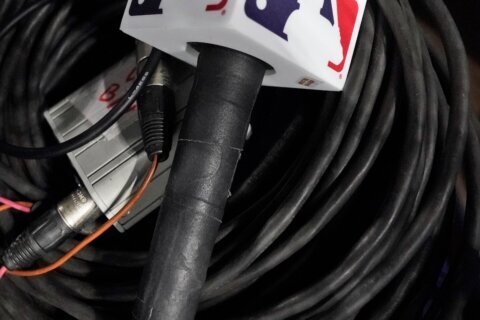Maury Wills really likes this story.
As a teenager, living in the Parkside housing projects off Kenilworth Avenue in Northeast D.C., he would play with a semipro team on Sundays during the summer. That team was the Pontiac Indians, so named because of the car dealership that sponsored them.
“These were grown, hardened men,” Wills told WTOP this week from his home in Arizona. The D.C. native will be honored Thursday evening as part of the 2019 DCSAA Hall of Fame.
“I learned to slide because these players, they had these half-pints of whiskey in their back pockets, and they had to slide during the game without breaking that bottle,” said Wills, explaining how that translated to his superior sliding ability in the Major Leagues.
“I learned to slide by watching them … Many times, the play was close, but I was such a good slider that I evaded the tag.”
The middle child in a family of 13 kids, Wills was born at Children’s Hospital and grew up in Garfield Heights, just off Alabama Avenue in Southeast D.C.
“We had beans for breakfast, beans for lunch, beans for dinner,” he said of his childhood. “I think we might have even had jelly beans for dessert.”
That didn’t stop Wills from becoming a three-sport star at Cardozo High School, where he played both ways on the football team as quarterback and safety, was a guard on the hardwood, and a star pitcher on the baseball diamond.
But his first love was always baseball, thanks to a formative childhood memory that lives with him even today, at age 86, from listening to games on the radio.
“All the grown people were talking about this black man up in Brooklyn named Jackie Robinson. ‘Jockie,’” said Wills, inflecting the first vowel. “Jockie, they called him. I walked away scratching my head, saying ‘I’m going to play for the Dodgers someday.’”
Though he’s now known for his speed, Wills thought his future in baseball was going to be on the mound. So did the men he played with on weekends.
One day, Wills saw an ad in the Washington Daily News for a tryout at Griffith Stadium, home of the Washington Senators at Georgia Avenue and Florida Avenue NW, the site of Howard Hospital today. Wills brought his spikes and gloves and waited for hours, only never to hear his number called. Suddenly, a scout stood up to dismiss everyone and send them home.
But Wills’ teammates, who had been sitting out in the sun all day drinking, waiting for his chance, were having none of it.
“They went down and jacked up the man with the megaphone. They said, ‘We brought this boy here for you to see, and he’s good, and we want you to see him.’ And they put enough fear into him that he said, ‘OK,’ and they prolonged the camp for a little bit,” said Wills.
According to Wills, he struck out three straight batters without anyone making contact, then did the same in a second simulated inning, earning himself a second tryout at a camp up in Havre de Grace, Maryland. That second tryout eventually got him signed by the Dodgers.
But despite his success on the mound, they foresaw a different future for him.
“I was so little, they said, ‘No, you’re too little to be a pitcher.’”
But Wills’ athleticism and strong arm played up well for his future at shortstop. Still, he once begged his way onto the mound in one blowout game. But he couldn’t get anybody out, cementing his place at shortstop, leading eventually to a prolific career.
If there’s something between the proverbial Hall of the Very Good and Cooperstown, Wills resides in that space. A seven-time All-Star, three-time World Series champion, and two-time Gold Glove Award winner, his crowning achievement was the 1962 National League MVP campaign, during which he set a then-MLB record with 104 stolen bases. He posted three other Top-10 MVP finishes, wrapping his career with 586 stolen bases, still 20th all-time in MLB history.
Wills garnered more than 40 percent of the vote just once, in 1981, eventually falling off the ballot in 1992. In 2014, he was nominated again through the National Baseball Hall of Fame’s Golden Era Committee, but fell three votes shy of election.
But it’s crazy to think what might have been for Wills, who spent a full eight-and-a-half seasons in the Dodgers minor league system, blocked at shortstop by the likes of Pee Wee Reese and Don Zimmer. He played a full 1,100 minor league games, but stayed motivated by the dream formed all those years earlier, on the streets of D.C., hearing about the man in Brooklyn on the radio.
“I just believed in myself and I really wanted to play professional ball because of Jackie Robinson,” said Wills.
Before he ever got to the majors, Wills had the chance to play for the Jackie Robinson All-Stars, a barnstorming summer team made up of Dodgers players and farmhands. Even though Wills was the MVP of the 1962 All-Star Game played at RFK Stadium, he counts playing with Robinson as his greatest career highlight. Playing against the Indianapolis Clowns of the Negro Leagues first in Baltimore, then across the south, Wills got the chance to take the field with his idol, something he would never get the chance to do in Dodger blue.
Wills finally broke into the majors 60 years ago to the day. On Thursday, June 6, 1959, he started at shortstop on the road against the Milwaukee Braves.
He was finally a Dodger, just like “Jockie.”






